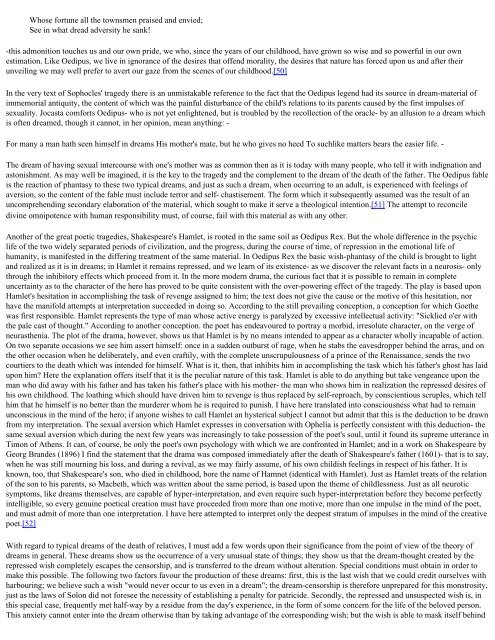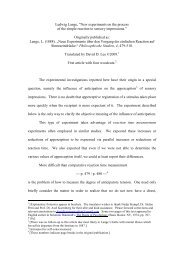The Interpretation Of Dreams Sigmund Freud (1900) PREFACE
The Interpretation Of Dreams Sigmund Freud (1900) PREFACE
The Interpretation Of Dreams Sigmund Freud (1900) PREFACE
You also want an ePaper? Increase the reach of your titles
YUMPU automatically turns print PDFs into web optimized ePapers that Google loves.
Whose fortune all the townsmen praised and envied;<br />
See in what dread adversity he sank!<br />
-this admonition touches us and our own pride, we who, since the years of our childhood, have grown so wise and so powerful in our own<br />
estimation. Like Oedipus, we live in ignorance of the desires that offend morality, the desires that nature has forced upon us and after their<br />
unveiling we may well prefer to avert our gaze from the scenes of our childhood.[50]<br />
In the very text of Sophocles' tragedy there is an unmistakable reference to the fact that the Oedipus legend had its source in dream-material of<br />
immemorial antiquity, the content of which was the painful disturbance of the child's relations to its parents caused by the first impulses of<br />
sexuality. Jocasta comforts Oedipus- who is not yet enlightened, but is troubled by the recollection of the oracle- by an allusion to a dream which<br />
is often dreamed, though it cannot, in her opinion, mean anything: -<br />
For many a man hath seen himself in dreams His mother's mate, but he who gives no heed To suchlike matters bears the easier life. -<br />
<strong>The</strong> dream of having sexual intercourse with one's mother was as common then as it is today with many people, who tell it with indignation and<br />
astonishment. As may well be imagined, it is the key to the tragedy and the complement to the dream of the death of the father. <strong>The</strong> Oedipus fable<br />
is the reaction of phantasy to these two typical dreams, and just as such a dream, when occurring to an adult, is experienced with feelings of<br />
aversion, so the content of the fable must include terror and self- chastisement. <strong>The</strong> form which it subsequently assumed was the result of an<br />
uncomprehending secondary elaboration of the material, which sought to make it serve a theological intention.[51] <strong>The</strong> attempt to reconcile<br />
divine omnipotence with human responsibility must, of course, fail with this material as with any other.<br />
Another of the great poetic tragedies, Shakespeare's Hamlet, is rooted in the same soil as Oedipus Rex. But the whole difference in the psychic<br />
life of the two widely separated periods of civilization, and the progress, during the course of time, of repression in the emotional life of<br />
humanity, is manifested in the differing treatment of the same material. In Oedipus Rex the basic wish-phantasy of the child is brought to light<br />
and realized as it is in dreams; in Hamlet it remains repressed, and we learn of its existence- as we discover the relevant facts in a neurosis- only<br />
through the inhibitory effects which proceed from it. In the more modern drama, the curious fact that it is possible to remain in complete<br />
uncertainty as to the character of the hero has proved to be quite consistent with the over-powering effect of the tragedy. <strong>The</strong> play is based upon<br />
Hamlet's hesitation in accomplishing the task of revenge assigned to him; the text does not give the cause or the motive of this hesitation, nor<br />
have the manifold attempts at interpretation succeeded in doing so. According to the still prevailing conception, a conception for which Goethe<br />
was first responsible. Hamlet represents the type of man whose active energy is paralyzed by excessive intellectual activity: "Sicklied o'er with<br />
the pale cast of thought." According to another conception. the poet has endeavoured to portray a morbid, irresolute character, on the verge of<br />
neurasthenia. <strong>The</strong> plot of the drama, however, shows us that Hamlet is by no means intended to appear as a character wholly incapable of action.<br />
On two separate occasions we see him assert himself: once in a sudden outburst of rage, when he stabs the eavesdropper behind the arras, and on<br />
the other occasion when he deliberately, and even craftily, with the complete unscrupulousness of a prince of the Renaissance, sends the two<br />
courtiers to the death which was intended for himself. What is it, then, that inhibits him in accomplishing the task which his father's ghost has laid<br />
upon him? Here the explanation offers itself that it is the peculiar nature of this task. Hamlet is able to do anything but take vengeance upon the<br />
man who did away with his father and has taken his father's place with his mother- the man who shows him in realization the repressed desires of<br />
his own childhood. <strong>The</strong> loathing which should have driven him to revenge is thus replaced by self-reproach, by conscientious scruples, which tell<br />
him that he himself is no better than the murderer whom he is required to punish. I have here translated into consciousness what had to remain<br />
unconscious in the mind of the hero; if anyone wishes to call Hamlet an hysterical subject I cannot but admit that this is the deduction to be drawn<br />
from my interpretation. <strong>The</strong> sexual aversion which Hamlet expresses in conversation with Ophelia is perfectly consistent with this deduction- the<br />
same sexual aversion which during the next few years was increasingly to take possession of the poet's soul, until it found its supreme utterance in<br />
Timon of Athens. It can, of course, be only the poet's own psychology with which we are confronted in Hamlet; and in a work on Shakespeare by<br />
Georg Brandes (1896) I find the statement that the drama was composed immediately after the death of Shakespeare's father (1601)- that is to say,<br />
when he was still mourning his loss, and during a revival, as we may fairly assume, of his own childish feelings in respect of his father. It is<br />
known, too, that Shakespeare's son, who died in childhood, bore the name of Hamnet (identical with Hamlet). Just as Hamlet treats of the relation<br />
of the son to his parents, so Macbeth, which was written about the same period, is based upon the theme of childlessness. Just as all neurotic<br />
symptoms, like dreams themselves, are capable of hyper-interpretation, and even require such hyper-interpretation before they become perfectly<br />
intelligible, so every genuine poetical creation must have proceeded from more than one motive, more than one impulse in the mind of the poet,<br />
and must admit of more than one interpretation. I have here attempted to interpret only the deepest stratum of impulses in the mind of the creative<br />
poet.[52]<br />
With regard to typical dreams of the death of relatives, I must add a few words upon their significance from the point of view of the theory of<br />
dreams in general. <strong>The</strong>se dreams show us the occurrence of a very unusual state of things; they show us that the dream-thought created by the<br />
repressed wish completely escapes the censorship, and is transferred to the dream without alteration. Special conditions must obtain in order to<br />
make this possible. <strong>The</strong> following two factors favour the production of these dreams: first, this is the last wish that we could credit ourselves with<br />
harbouring; we believe such a wish "would never occur to us even in a dream"; the dream-censorship is therefore unprepared for this monstrosity,<br />
just as the laws of Solon did not foresee the necessity of establishing a penalty for patricide. Secondly, the repressed and unsuspected wish is, in<br />
this special case, frequently met half-way by a residue from the day's experience, in the form of some concern for the life of the beloved person.<br />
This anxiety cannot enter into the dream otherwise than by taking advantage of the corresponding wish; but the wish is able to mask itself behind



